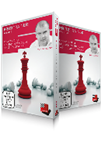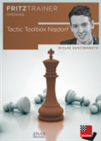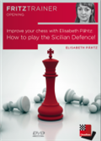Kader-Challenge 2021
This tournament was organized for German players to get some “playing practice” above all, and it was supposed to be an “assessment of the current situation” according to the German Chess Federation’s website. The first goal mentioned above succeeded excellently: despite the sanitary crisis, all games could be played as planned. As far as the second goal, one has the feeling that the years-long wait for a German super grandmaster with an Elo rating above 2700 points could soon come to an end.
 These DVDs are about Understanding Middlegame Strategies. In the first DVD dynamic decisions involving pawns are discussed. The second DVD deals with decision making process concerning practical play.
These DVDs are about Understanding Middlegame Strategies. In the first DVD dynamic decisions involving pawns are discussed. The second DVD deals with decision making process concerning practical play.Several players have shown excellent performances, and with Frederik Svane the next young player has already knocked audibly on the door. Actually, there seem to be at least half a dozen German players who can be expected to make it over the magic threshold. In the long run, the good work done with the juniors in numerous clubs seems to be paying off. The fact that the 2700 points are still a long time coming is perhaps simply due to the — Covid-related — lack of playing opportunities. And that brings us back to the first point.
The German Minister of Labour wants to make Covid-19 tests compulsory in all German companies. When a minister brings out such heavy artillery, it only confirms the suspicion that the virus will probably be with us for a long time. In the short term, there can only be more playing practice if more potential tournament organizers deal with these questions and come up with practicable solutions. As a chess lover who likes to follow big tournaments, one can only hope that this will happen. Not holding any chess tournaments at all for months on end cannot be the solution.
But you can also get playing practice on the internet. Initially, we did not know why Vincent Keymer had cancelled his participation, but it quickly became clear that Keymer would rather play the online Polgar Challenge, which overlapped with the Kader-Challenge. This step is understandable: anyone who can imagine a professional career as a chess player will hardly say no if the Play Magnus Group invites them to tournaments. Who knows whether one will ever gain access to this extremely lucrative chess ecosystem again if one recklessly turns down a first invitation?! Nevertheless, the long games of the Kader-Challenge are of course much more demanding. “Online is fun”, many professionals say quite openly. When both happen at the same time, sometimes you just have to decide which you prefer.
Let’s take a look at the top game of Round 9 between Matthias Bluebaum and Dmitrij Kollars:

Matthias Bluebaum and Dmitrij Kollars | Photo: Sandra Schmidt

Alexander Donchenko and Frederik Svane | Photo: Sandra Schmidt
 The aim of this DVD is to demonstrate the typical tactical themes of the Sicilian Najdorf and to improve your understanding of them, as well as to practice them with the interactive examples.
The aim of this DVD is to demonstrate the typical tactical themes of the Sicilian Najdorf and to improve your understanding of them, as well as to practice them with the interactive examples.
Luis Engel and Daniel Fridman | Photo: Sandra Schmidt
Results - Round 9
Final standings
All games
Women’s tournament
Elisabeth Paehtz needed to win her last-round game against Jana Schneider to clinch tournament victory at the last minute, but she didn’t manage — the clear Elo favourite had to settle for a draw. Tournament victory went to Jana Schneider, who with her 5/7 finished a half point above Paehtz. Whether something better was possible for Paehtz on move 13 is not an easy question to answer and probably needs to be analysed in more detail:
 The continuous stream of new ideas in the Sicilian makes 1..c5 the most popular answer to 1.e4. On this DVD I do give an introduction to the most important Sicilian systems.
The continuous stream of new ideas in the Sicilian makes 1..c5 the most popular answer to 1.e4. On this DVD I do give an introduction to the most important Sicilian systems.
Elisabeth Paehtz and Jana Schneider | Photo: Sandra Schmidt

Jana Schneider has shown that you can also win a big tournament with the mask on | Photo: Kevin Högy
Karsten Müller found an interesting endgame in the last round of the women’s tournament. Analysing the game between Antonia Ziegenfuß and Annmarie Muetsch, the endgame expert demonstrates the rule developed by the Italian Luigi Centurini (1820-1900) who showed when a same-coloured bishop ending is a draw despite one side having an extra pawn:
Results - Round 7
Final standings
All games
Links
























